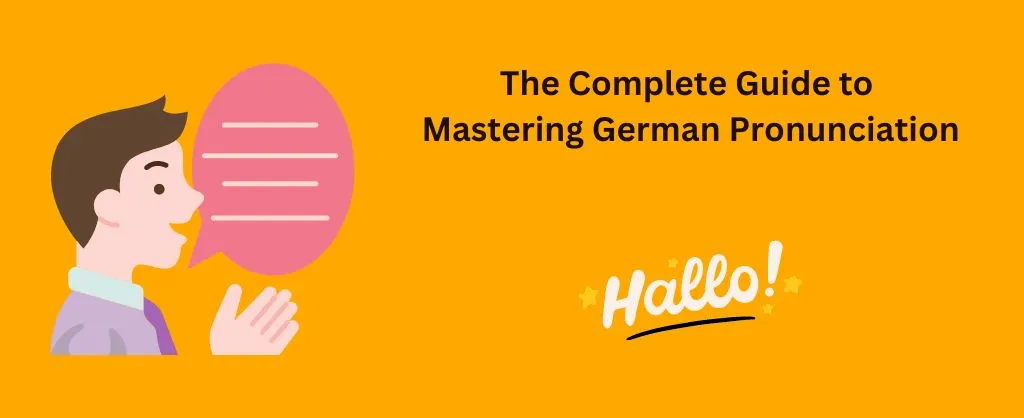It is always fascinating to acquire a fresh language, and in the same regard, German language learning can be fun and a whole lot easier if mastered, bearing in mind that pronunciation is key. German is different from most of the other languages and has peculiar intonations and particularities that are a little tricky for a learner. But don’t worry! As for the tips and practices outlined below, you can enhance your German Language Skills and make yourself sound like a native. So, Here are the Tips for Improving your German Pronunciation.
Understanding the German Language and Alphabet
Before learning the German language, it is important to understand the German alphabet more. In order to fix your German pronunciation, first learn the proper way of pronouncing the German Language Alphabet. The German language uses some letters that are slightly different from those of the English language, like ä, ö, ü and ß & hence, studying these extra letters and their corresponding sound will create a strong base for you.
First, you can try and read it letter by letter while producing the sounds out loud and then comparing them to the English sounds. For instance, ‘w’ is pronounced like ‘v,’ and ‘v’ is like ‘f’. By doing this, you will slowly get the hang of the truly sound of the German language.

1. Listen and Repeat
Another strategy that helps in enhancing German pronunciation is you have to listen carefully. You can find German pronunciation audio in podcasts, language learning applications, or on YouTube, so try to listen to the sounds of the language. Just listen to the way the Americans pronounce their words especially the hard combinations of vowels or consonants.
In case of listening attempt to imitate the sounds as well as you can. One of the used approaches is referred to as shadowing where the learner is required to immediately parrot what he or she hears in the new accent.
2. Practice the Umlauts
The umlauts—ä, ö, and ü—are vowels that can be particularly challenging for non-native speakers. These vowels are crucial in many words, so mastering them is essential for proper German pronunciation.
- Ä: This sound is close to the ‘e’ in bed in English but the sound is wider, it is slightly pronounced farther back in the mouth.
- Ö: It is like the ‘o’ in word but with lips protruding outwards a little bit more than in the former case.
- Ü: Unfortunately, there is no equivalent of this sound in the English language: you can try pronouncing ‘ee’ as in ‘see’ and round the lips slightly. With practice, you can enhance your speaking skills.
3. Stress and Intonation require special attention in German Pronunciation
In particular, both stress and intonation can turn words and sentences around in German. It is important to remember that in contrast to English, the German language has a feature that can put stress on different syllables. For example, in the meaning of the word *umfahren* you can lay more emphasis on the first part of the word and make it mean ‘to drive around’ or lay emphasis on the second part of the word and make it mean ‘to run over’.
In order to master intonation, practice reading something out loud and place extra emphasis on different syllables than you normally would. After some time you get the flow of the language and you are fluent in it.
4. Work on Your Consonants
German consonants can be tricky, especially the “ch” sound, which comes in two varieties. The aforementioned knowledge types are soft and hard. The’sch’ sound, the sound used in such words as ‘ich’, for example, is produced with the middle of the tongue occipitally elevated towards the roof of the mouth. The first hard “ch” sound is when the back of the tongue touches the soft part of the roof of the mouth, and its sound is heard in words such as ‘Bach’.
To practice sounds, speak words that contain them and pay attention to the position of the tongue and air stream during speaking.
5. Take advantage of the World Wide Web and Applications
On the Internet, there are a few very useful Websites that you might find useful in order to practice your German pronunciation. Thus, Duolingo, Babbel, or Rosetta stone applications contain pronunciation exercises that are helpful in this regard. These apps provide you with German pronunciation audio to practice with a native speaker.
Besides apps, there are websites, for example, Forvo or Linguee can be useful. They will give you an idea of how various native English speakers actually say those words, and most importantly, they demonstrate for you the regional variations or the other versions of intonations.
6. Record Yourself Speaking While Speaking German Pronunciation

Another good utilization of German is that it is useful to record what you say in that language in order to monitor your progress. If you make a recording, listen closely to how you are pronouncing these words as compared to the native speakers. Are there some specific spoken elements, which should be left and pronounced more clearly? In this way, you can identify these areas, and when practicing, you will be able to target these areas so that you can improve.
The best way to improve any Foreign Language is through practice, which can be done with a language partner. It is sometimes very useful to meet a language partner, whether online or live, face to face. If you want to have a real-time correction for your pronunciation, it is preferable to have a native German-speaking person around. If you can’t find a partner, participate in a language exchange or use Tandem or HelloTalk applications, for example.
7. Engage with German Media
Last but not least, you should also listen to German media products like movies, TV shows, or songs, as it can help to improve your pronunciation. It is always helpful to listen to the native German either by watching the German films with subtitles or listening to the German music, so you hear how the language sounds and what .
8. Be Patient and Persistent While Learning German Pronunciation
Like I said before, there is no shortcut to mastering the art of pronunciation in German so just accept the fact that it will be a slow process. It is also important to practice often, thus it would be helpful to incorporate most of these tips in everyday practice. As you continue using the names, the more they roll off your tongue, and in the long run, you are going to have a props dictionary.
German Language Courses By Kodakco

If you want to learn the German Language more efficiently and be more focused on the particular language aspects, then, it is best to take a course. Henry Harvin offers several German language courses that are highly rated and effective. Henry Harvin German Language Course is for beginners and Advanced learners, where we learn the sounds, words, and grammar of German. For a novice fluent user, this is the perfect place to start. All courses come with a program that addresses the various aspects of language learning that can enable you to master German language pronunciation, among other skills.
Conclusion
Making your sounds more precise will give you a relative self-satisfaction since it also enriches not only your communication but also your cultural experience. These tips could hardly used if not practised. However, if you practice these English-to-German transition tips with consistent determination, then you get an improved accent in German when you’re a learner or a more natural-sounding, more confident accent if you are an advanced learner. So take it easy, relax and one day you will find yourself speaking this language with unequivocal fluency.
FAQs
German is the most used language in European countries; hence learning the German language can lead to great jobs. If you are able to speak the German language well, it will be rather advantageous for you to find a good job in various MNCs, KPOs, and BPOs with smart pay packages.
Indeed, there has been a consistent increase in the dependency of Indians on the German language in various sectors such as business, education, research, and tourism in view of the economic relation as well as educational and cultural inter-connection between India and German speaking countries.
To become fluent, you won’t have to practice for long, especially if you follow the tips and practices listed above. However, generally, after 6-8 months, if you invest your time studying intense courses, which can be around twenty hours a week, you can be able to get proficient in your German language to meet your day-to-day needs. Whoever says that it is impossible to gain professional proficiency within a bare year!!
So, if you wish to improve your skills and good pronunciation of the German language, you need to start listening more often. In the same way, one learns a language by copying the sound and the manner in which the mouth forms it, much can be learnt from watching German TV. Another great way of practising pronunciation is by listening to audibles or podcasts in order to improve the listening portion as well.



